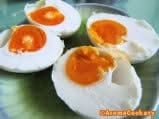 Salted eggs are easy to prepare. Salted egg is the product of preserving egg made by curing duck or chicken eggs in brine solution, or packing each egg in damp salted clay. Salted eggs are normally boiled or steamed before being peeled and eaten. They taste good with tomatoes. They are ready to be serve and not messy for people who do not want to be bothered with saucy preparations when bringing packed meals.
Salted eggs are easy to prepare. Salted egg is the product of preserving egg made by curing duck or chicken eggs in brine solution, or packing each egg in damp salted clay. Salted eggs are normally boiled or steamed before being peeled and eaten. They taste good with tomatoes. They are ready to be serve and not messy for people who do not want to be bothered with saucy preparations when bringing packed meals.
Being able to prepare salted eggs on your own saves money because they cost a lot more than raw ones. If desired, you can get a business started on salted eggs. They can be sold like hot cakes.
Salting Eggs using Pateros method
A popular method for processing salted eggs in the Philippines is the Pateros method. The salted egg is prepared Pateros style by mixing clay (from ant hills or termite mounds), table salt and water in the ratio of 1:1:2 until the texture of the admixture becomes smooth and forms a thick texture similar to cake batter. The fresh eggs are individually dipped in the admixture, and packed in 150-egg batches in newspaper-lined 10x12x18 inch wooden boxes (often residual boxes of dried fish packing). The whole batch is then lightly wrapped in newspapers to slow down the dehydration process.
The eggs are then stored indoors at room temperature over the next 12 to 14 days to cure. This way the salt works its way into the eggs uniformly in the batch. Curing can last up to 18 days, but that results in very long-lasting red eggs that can have a 40-day shelf life, which is largely unnecessary, as the eggs are stocked and replenished biweekly.
After the two-week curing period, the eggs are hand-cleaned with water and a brush and prepared to be boiled in low heat for 30 minutes. Time is measured from the first moment the water boils and the immersion of the eggs. The 50-egg batch is then wrapped in fish nets for ease of removal from the cookware. The cookware must be large enough to accommodate the batch with a two-inch covering of water.
Salting Eggs in Brine Solution
Ingredients:
– 12 Ducks eggs
– 12 cups water
– 6 cups salt
Procedures:
1. Boil 6 cups salt with 12 cups water. Cool the mixture after boiling.
2. Carefully place 12 duck eggs in a wide mouth glass jar.
3. Pour the brine solution into the jar. Weigh down the eggs with a plate to keep them from floating, or instead of jar, use a sealed plastic bag filled with the salt solution.
4. Cover the mouth of the jar with perforated paper, Keep the jar in a cool dry place.
5. Try one egg after 12 days. Soak the eggs again for 5 days more if the dried egg is not salty enough.
6. When the eggs are salty enough boil them for 10 minutes.
7. Color the egg’s shells if desired.
Salting Eggs in Clay
Ingredients:
– 12 cups of clay
– 12 cups of salt
– 12 pieces duck eggs
Procedures:
1. Mix 12 cups of clay and 12 cups salt. Add water to the mixture and mix thoroughly.
2. Transfer to a pot a considerable amount of the mixture.
3. Wrap the 12 eggs with clay. Arrange the eggs in the pot allowing 1-2 inches of space to prevent breaking of the shells.
4. Pour the remaining mixture into the pot. Store the eggs.
5. Taste an eggs after 15 days. If its not salty yet, restore the eggs.
6. When salty enough, hard boil the eggs. Add red food coloring into water to make colors in shell.
Homemade Salted Eggs
Ingredients:
– 9 chicken eggs
– table salt
– wine (use shao xing) or any cooking wine
– one 1/2 gallon ziploc bag
Method:
1. Dip egg into wine until well coated, then roll it over the salt.
2. Put egg into ziploc bag.
3. Repeat the procedure with the other eight eggs.
4. Close ziploc bag and wait for eggs to mature for 20 – 30 days. Eggs can be ready by 20 days but if not just wait a few more days before they are ready). Recipe found in Lily’s Wai Sek Hong.
Sources: trc.dost.gov.ph, en.wikipedia.org Photo: Aromacookery.com
Do you like this business idea? then please consider subscribing to our PINOY BISNES ![]() RSS feed. You can also subscribe by email and have new articles sent directly to your inbox. (Once you entered your e-mail address, you need to login to your e-mail account and click the link to confirm your subscription).
RSS feed. You can also subscribe by email and have new articles sent directly to your inbox. (Once you entered your e-mail address, you need to login to your e-mail account and click the link to confirm your subscription).




I just wondering po my diffences po ba ang clay at brine solution?? At ilang week po ang tinatagal after nagawa na yong po bang expired date ??
I prefer chicken eggs
hi! kailan po seminar nang salted eggs, san at magkano po ang seminar pay|? 1 day po ba yan? thank you!
very useful..planning to start a small business….
thank you sa info. i like to start my small business. marami itikan dito sa amin salted egg gusto ko try.hope sana makatulong kayo.
Thanks for this website….now i have an idea for doing my project about traditional biotechnology products!!!
oooooooooooooooooooooooooooohhhhhhhhhkkkkkkkkkkkkkkkkkkkkkkkkkkkkkkkkkkh
para saan ang wine para b yan sa flavoring/.
it is to add flavor
thanks! we can utilize thiese recipe guides in our cooking laboratory.. 🙂
cguro…
ayeeeeeeeeeeeeeeeeeeeeeeeeeeeeee
ayeeeeeeeeeeeeeeeeeeeeeeeeeeeeee
hmpppppp……………..
ok
ahhh nice1
would it be alright if i will color my salty eggs orange?
are you supposed to replace the brine solution everytime you put a new batch of eggs?